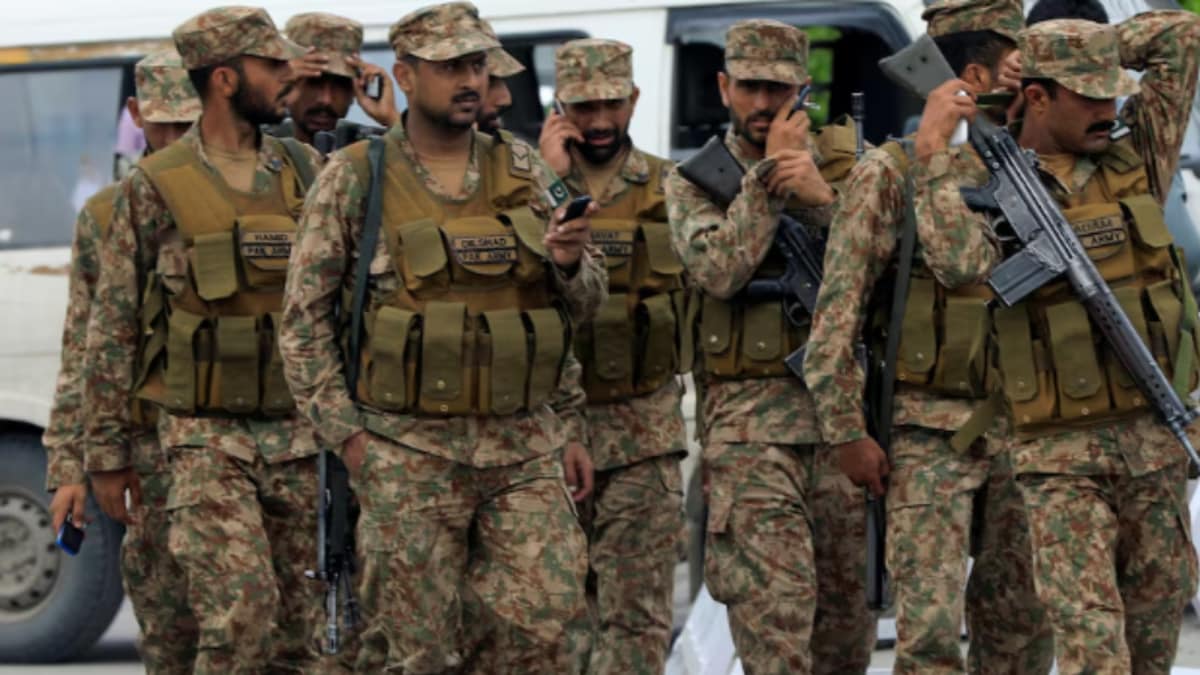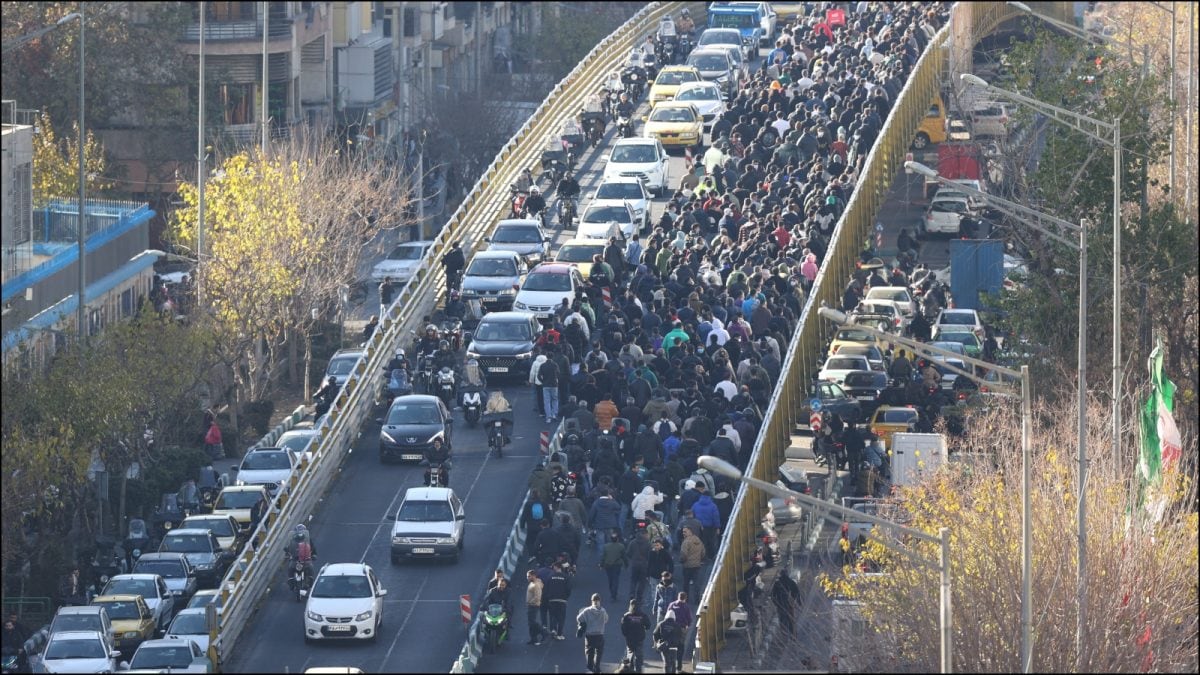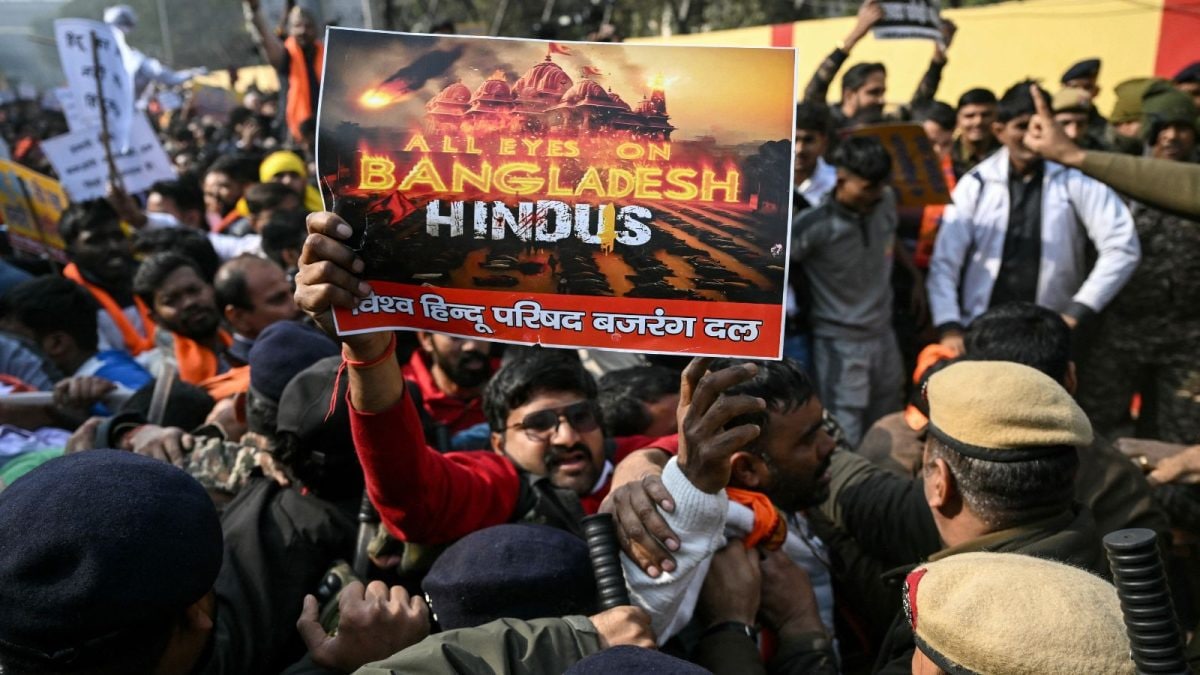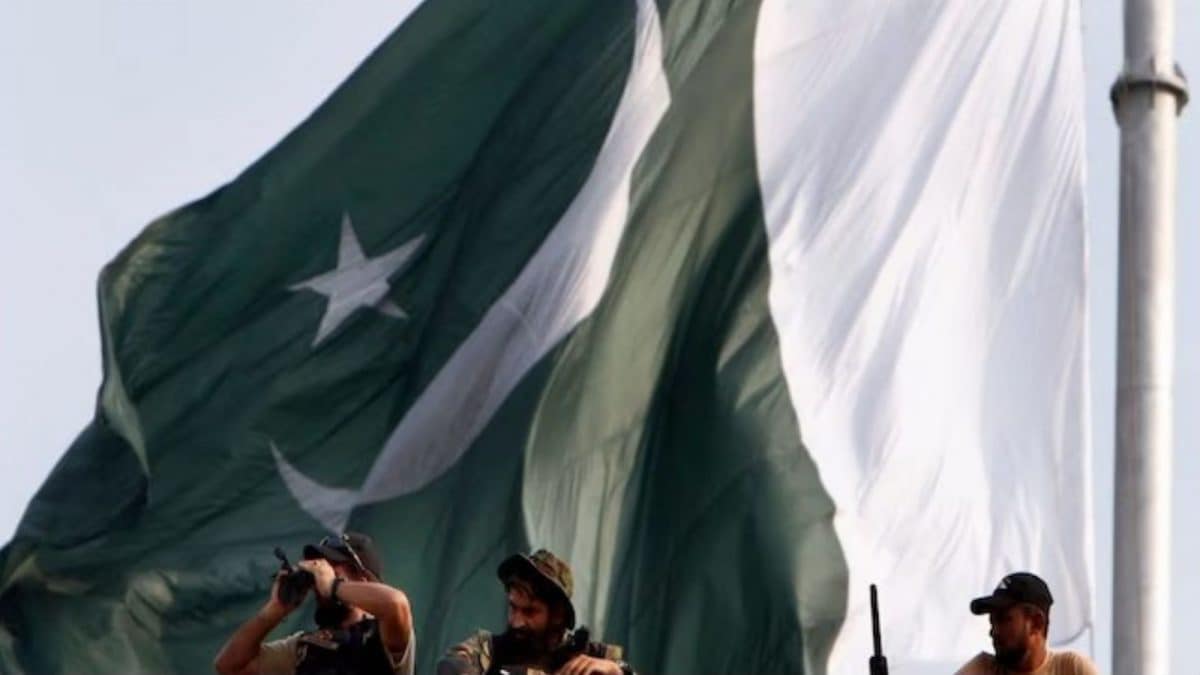Last Updated:November 10, 2025, 12:28 IST
Issuing arrest warrant is symbolic. It reinforces Erdogan’s claim of moral leadership in the Muslim world, projecting Turkey as a state, willing to fight Israel when others won't

The first cracks in Israel-Turkey ties emerged after Erdogan’s AKP came to power in 2002. The Gaza conflict has now effectively ended any possibility of reconciliation between the two nations. (Getty Images)
With Turkey issuing an arrest warrant against Prime Minister Benjamin Netanyahu and 37 other officials over alleged genocide and crimes against humanity in Gaza, there is a growing clamour that the current Tayyip Erdogan-led government is in no mood to normalise relations with Israel.
Though both Turkey and Israel have often been described as “reluctant partners", the latest escalation is unprecedented. The Middle Eastern states are bound by overlapping strategic interests but divided by political impulses, identity debates, and competing regional visions. Their relationship has swung between cooperation, crisis, and cautious resets for nearly three decades.
As regional tensions sharpen, new alliances take shape, and major powers reposition, the breakdown between Ankara and Tel Aviv raises deeper questions. What explains Erdogan’s fierce stance? What does this mean for Israel’s broader regional acceptance? And should India, which has good relations with both countries, be concerned?
Let us understand the decline of Turkey-Israel relations, the political and ideological stakes for both sides, the history that shaped this rivalry, and what the future geopolitical landscape could look like.
Why Has Erdogan Issued an Arrest Warrant Against Netanyahu?
President Erdogan’s call for an arrest warrant against Netanyahu must be understood in the context of Turkey’s political identity and its foreign-policy posture. Erdogan has positioned himself as a global defender of Muslim causes, particularly Palestine. For more than a decade, he has accused Israel of violating international law, targeting civilians, and seeking permanent control over Gaza and the West Bank.
Issuing an arrest warrant is symbolic, but politically potent. It reinforces Erdogan’s claim of moral leadership in the Muslim world, projecting Turkey as the state willing to confront Israel when others will not. It also plays strongly with Erdogan’s domestic base, which has a deep emotional attachment to the Palestinian issue.
The move reflects not only outrage at Israel’s actions in Gaza but also Erdogan’s long-standing rivalry with Netanyahu. Both leaders have used each other as political foils for years. Each sees the other as an ideological adversary with opposite visions for the Middle East: Erdogan pursuing Islamist-inflected diplomacy and soft power, Netanyahu asserting a security-driven, nationalist approach.
The arrest warrant demand marks the culmination of years of verbal conflict, diplomatic downgrades, and mutual suspicion. Yet it also raises a bigger question: how did two countries that once enjoyed extensive military, intelligence, and economic cooperation fall this far?
How Did Turkey-Israel Relations Enter A Steep Decline?
Turkey and Israel were once close allies — a partnership many now forget. In the 1990s and early 2000s, they shared military exercises, intelligence coordination, and deep defence ties. Turkish pilots trained in Israel; Israeli drones and radar systems became crucial to Turkey’s military modernisation.
The rupture began gradually and accelerated dramatically. The first cracks emerged after Erdogan’s AKP government came to power in 2002. Erdogan’s worldview differed sharply from Turkey’s secular elite, which had driven earlier cooperation with Israel. Erdogan embraced a more assertive Islamic identity in foreign policy, often speaking out against Israeli actions in Gaza and Lebanon.
The breaking point came in 2010 with the Mavi Marmara incident, when Israeli commandos boarded a Turkish flotilla attempting to break the Gaza blockade. The clash resulted in multiple Turkish deaths and unleashed a wave of public anger. Ankara expelled the Israeli ambassador, froze defence cooperation, and demanded an apology.
While relations eventually saw partial resets, including restored ambassadors in 2016 and 2022, the fundamental distrust remained. Each flare-up in Gaza reignited tensions. And every attempt at rebuilding ties was fragile, overshadowed by competing ambitions in the Eastern Mediterranean, Syria, Libya, and the Gulf.
The most recent Gaza conflict has effectively ended any lingering possibility of partnership. Erdogan now treats Netanyahu not as a difficult neighbour but as a global adversary whose policies he intends to challenge both diplomatically and legally.
The History Of Turkey-Israel Ties: When Was The Golden Period?
The “golden period" of Turkey-Israel relations dates roughly from 1996 to 2002, when both countries viewed each other as strategic necessities.
Turkey needed Israeli intelligence and military technology at a time when it faced Kurdish militancy, regional isolation, and internal instability. Israel saw Turkey as a rare, reliable Muslim-majority partner that could anchor its presence in a volatile region.
During this period, trade between both countries soared, defence deals multiplied, intelligence agencies cooperated closely, joint military exercises became routine and diplomatic engagement was warm and frequent.
This partnership was rooted in shared geopolitical concerns: containing Syria, countering Iran, and balancing Arab nationalism.
But the golden age depended heavily on Turkey’s secular Kemalist establishment, which was based on six principles – republicanism, nationalism, populism, statism, secularism, and revolutionism. Once Erdogan rose to power with a new ideological framework, that foundation eroded. Turkey’s foreign policy shifted from secular realpolitik towards identity-driven regional leadership, especially on Muslim issues. That trajectory inevitably placed it at odds with Israel.
The Strategic Fault Lines: Why the Two Countries Keep Clashing
Turkey and Israel’s conflict today is shaped not only by Gaza but also by deeper strategic divides that have grown over time.
Competing Regional Leadership Visions: Turkey under Erdogan wants to position itself as a leader in the Muslim world. Israel wants recognition as a legitimate regional power. These ambitions clash over Palestine and broader Middle Eastern politics.
Divergent Ideologies: Erdogan’s political ideology draws from conservative Islamist roots, while Netanyahu’s government leans heavily nationalism. Each sees the other as part of a global ideological struggle.
Conflicting Alliances: Israel is strengthening ties with the UAE, Saudi Arabia, Egypt, and Greece — countries that often have strained ties with Turkey. Turkey supports Qatar and has backed Islamist movements in the past, which many Arab states and Israel view with suspicion.
Rivalry In The Eastern Mediterranean: Turkey and Israel compete for energy influence in the region. Israel’s gas partnerships with Greece and Cyprus directly challenge Turkey’s maritime claims.
Syria & Iran: Israel frequently targets Iranian-linked groups in Syria. Turkey has its own military operations there. Their objectives do not always align.
Public Opinion As A Driver: Both leaders rely heavily on nationalist rhetoric. Anti-Israel sentiment plays well in Turkish politics. Anti-Erdogan sentiment resonates in Israel. This creates incentives for confrontation. These fault lines ensure that even when diplomacy resumes, the partnership remains fragile.
Does Turkey-Israel Tension Affect India?
India maintains strong relations with both Turkey and Israel, but in very different ways.
Israel is one of India’s most important defence partners, supplying drones, missiles, radars, and cybersecurity technology. The two countries cooperate closely on intelligence, agriculture, water management and cutting-edge research.
While India’s relationship with Turkey has been less stable, Ankara’s repeated support for Pakistan on Kashmir has strained ties. Turkish military cooperation with Islamabad and public statements against India’s domestic policies have also created friction.
Given this backdrop, the Turkey–Israel conflict does not directly threaten India’s strategic interests. But there are indirect considerations.
India Could Face Diplomatic Balancing Acts
India supports Palestinian rights while maintaining strong ties with Israel. Turkey, meanwhile, pushes a more aggressive pro-Palestine narrative. India needs to ensure it does not get drawn into rhetorical crossfire.
Defence Cooperation Could Be Affected Indirectly
India’s defence ties with Israel are strong. Turkey’s growing alignment with certain Islamist blocs may lead to sharper ideological confrontations in multilateral forums, occasionally placing India in uncomfortable diplomatic spaces.
West Asian Stability Is Crucial For India
Millions of Indian workers live in the Gulf. Any Turkey-Israel confrontation that destabilises the broader region could have economic ripple effects.
India’s Stake In East Mediterranean Energy
New energy alliances involving Israel, Greece, Cyprus, and Egypt could benefit India’s exploration and energy partnerships. Turkey’s opposition to these alliances could complicate future opportunities.
Overall, India is unlikely to take sides, but the geopolitical shifts matter.
What Happens Next? The Geopolitical Future For Both Countries
Turkey and Israel are entering a long, cold phase of relations unless leadership changes or major regional realignments occur. The next steps will depend on several possible scenarios.
Turkey To Rally Muslim Public Opinion: Erdogan’s domestic support often rises when he adopts fiery rhetoric on Palestine. Expect more speeches, diplomatic pressure, and legal activism targeting Israel.
Israel To Double Down On Regional Partnerships: Israel is likely to deepen ties with the UAE, Saudi Arabia, Egypt, and Greece to counter Turkey’s influence. These partnerships may expand into security, energy, and technology.
US To Attempt Damage Control: Both Turkey and Israel are US partners, though in different ways. Washington may try to prevent the rift from undermining broader regional stability, but results are uncertain.
Gaza To Remain The Central Battlefront: As long as conflict in Gaza continues, political leaders in both countries will find it difficult, even impossible, to de-escalate rhetoric.
Economic Pragmatism Could Lead To Limited Resets: Trade between Turkey and Israel remains significant, despite political hostility. Economic realities may force limited cooperation in the future, even if political reconciliation remains out of reach.
Leadership Changes Could Rewrite Narratives: Netanyahu faces intense domestic pressure. Erdogan has consolidated his political power, but he confronts economic challenges. A change in leadership in either country could soften the relationship.
Turkey and Israel’s relationship has plunged into one of its most volatile periods. Erdogan’s arrest warrant demand is not an isolated gesture but part of a long trajectory of ideological divergence, regional competition, and personal rivalry between two powerful leaders.
For Israel, this is another challenge to its regional legitimacy as it fights diplomatic battles on multiple fronts. For Turkey, this is a chance to reclaim leadership in the Muslim world at a time when Erdogan faces domestic and international scrutiny.
For India, the fallout does not pose direct risks, but contributes to an increasingly complex Middle Eastern landscape — one that India must navigate carefully to protect its energy, economic, and strategic interests.
The story of Turkey and Israel is ultimately about two nations with shared security concerns but clashing worldviews. Their future relationship will depend not only on geopolitics, but on whether either side is willing to look beyond the narratives that now define them.
Shilpy Bisht, Deputy News Editor at News18, writes and edits national, world and business stories. She started off as a print journalist, and then transitioned to online, in her 12 years of experience. Her prev...Read More
Shilpy Bisht, Deputy News Editor at News18, writes and edits national, world and business stories. She started off as a print journalist, and then transitioned to online, in her 12 years of experience. Her prev...
Read More
First Published:
November 10, 2025, 12:28 IST
News explainers Erdogan’s Warning To Netanyahu: Understanding The Collapse Of Turkey-Israel Ties And India’s Stakes
Disclaimer: Comments reflect users’ views, not News18’s. Please keep discussions respectful and constructive. Abusive, defamatory, or illegal comments will be removed. News18 may disable any comment at its discretion. By posting, you agree to our Terms of Use and Privacy Policy.
Stay Ahead, Read Faster
Scan the QR code to download the News18 app and enjoy a seamless news experience anytime, anywhere.


 1 month ago
1 month ago


















